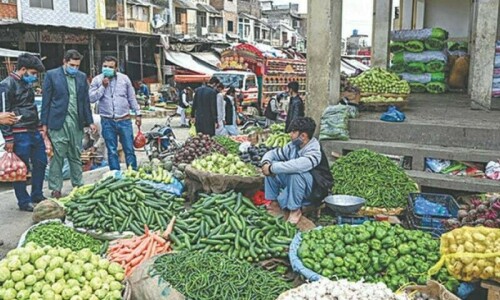ISLAMABAD: The short-term inflation surged 44.16 per cent year-on-year in the week ending on Jan 11, the steepest increase observed since May 2023, official data showed on Friday.
The persistent rise in inflation, observed in the first week of the new year, indicates no signs of deceleration in the near term. This spike is primarily fuelled by a surge in gas prices, electricity tariffs, and the cost of essential kitchen items.
The weekly inflation measured by the Sensitive Price Index (SPI) hit a record 48.35pc year-on-year in early May 2023 but then decelerated as low as 24.4pc in late Aug 2023 before surging past 40pc during the week ending on Nov 16, 2023. Since then, the SPI has remained above 41pc consecutively.
With the latest reading, the weekly inflation remained above 41pc for the ninth week in a row, according to the Pakistan Bureau of Statistics.
The SPI witnessed a 1.36pc week-on-week increase as of Jan 11. This rise follows last week’s increase of 0.81pc.
On an annual basis, the items whose prices increased the most included gas charges for Q1 (1108.59pc), tomatoes (155.83pc), cigarettes (93.22pc), chillies powder (81.74pc), garlic (60.43pc), gents sponge chappal (58.05pc), sugar (57.20pc), wheat flour (55.26pc), gents sandal (53.37pc), rice Irri-6/9 (51.57pc), gur (50.58pc) and rice basmati broken (46.91pc).
In contrast, the prices of mustard oil dropped 7.10pc year-on-year, followed by onions (-6.68pc), vegetable ghee (1.67pc) and bananas (1.53pc).
The short-term, or weekly, inflation is measured by a basket of goods and services called the SPI, which stood at 317.82 compared to 313.66 in the preceding week and 220.53 a year ago.
The index, comprising 51 items collected from 50 markets in 17 cities, is computed weekly to assess the prices of essential commodities and services at shorter intervals. On a weekly basis, the SPI inflation was recorded at 1.36pc. Data showed that the prices of 21 items increased, those of eight items decreased and those of 22 items remained stable compared to the previous week.
The items whose prices saw the highest increase week-on-week included tomatoes (15.63pc), onions (8.94pc), chicken (6.42pc), electricity charges for Q1 (5.11pc), eggs (4.31pc), matchbox (2.56pc), gur (2.30pc), LPG (2.29pc), pulse gram (2.11pc), energy sever (1.40pc), pulse mash (0.83pc) and rice Irri-6/9 (0.67pc).
The items whose prices dropped the most over the previous week included potatoes (5.92pc), vegetable ghee 1kg (0.84pc), sugar (0.43pc), vegetable ghee 2.5kg (0.29pc), mustard oil (0.26pc), cooking oil five-litre (0.17pc), garlic (0.13pc) and pulse moong (0.06pc).
Published in Dawn, January 13th, 2024
















































Dear visitor, the comments section is undergoing an overhaul and will return soon.